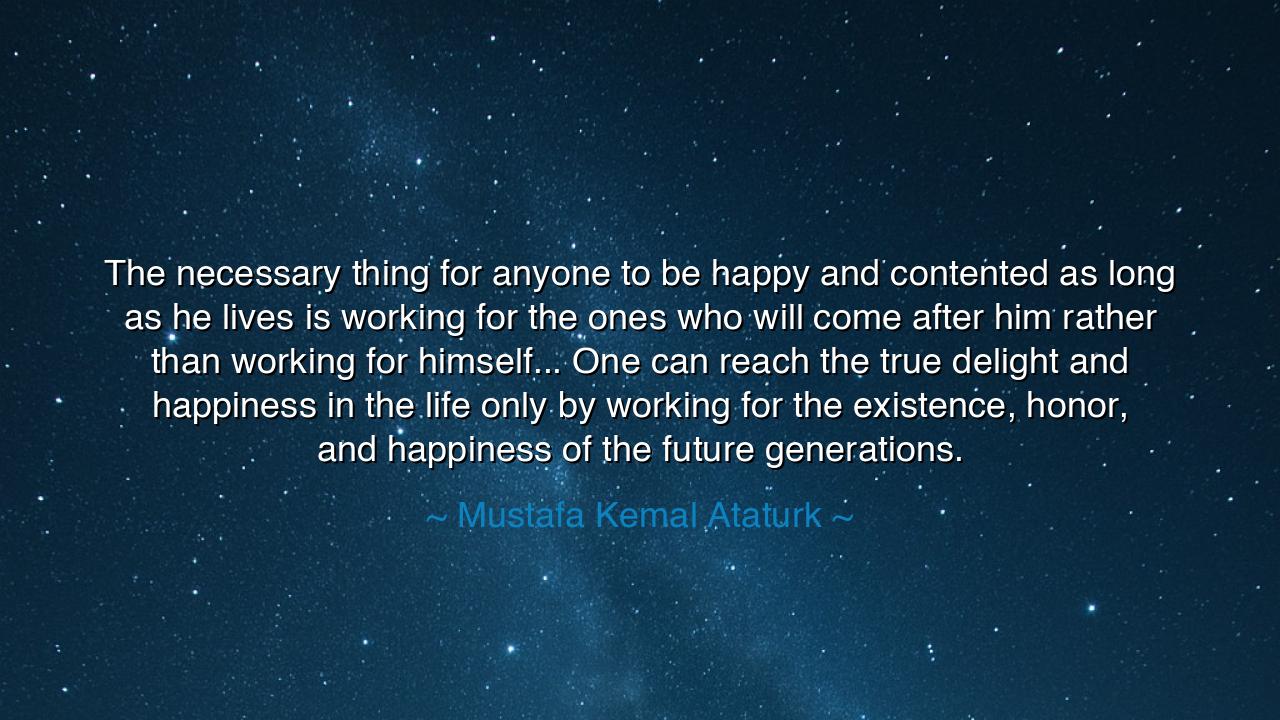
The necessary thing for anyone to be happy and contented as long
The necessary thing for anyone to be happy and contented as long as he lives is working for the ones who will come after him rather than working for himself... One can reach the true delight and happiness in the life only by working for the existence, honor, and happiness of the future generations.






In the grand scheme of life, the pursuit of happiness and contentment often leads us down paths that are centered on the self—on personal gain, comfort, and immediate satisfaction. Yet, Mustafa Kemal Atatürk offers a deeper, more enduring vision when he states, "The necessary thing for anyone to be happy and contented as long as he lives is working for the ones who will come after him rather than working for himself... One can reach the true delight and happiness in life only by working for the existence, honor, and happiness of the future generations." Atatürk's words call us to look beyond the fleeting pleasures of personal achievement and to invest in the legacy we leave behind for future generations. The pursuit of happiness, he suggests, is not rooted in self-serving pleasures, but in the selfless work we do to elevate the world that will come after us.
In the ancient world, the idea of working for future generations was held in high regard by the most honorable individuals. The Greeks, with their love for philosophy, often discussed the nature of virtue and how it could be cultivated not for personal glory but for the betterment of society. Socrates himself believed that true wisdom was not the pursuit of power or wealth, but the ability to contribute meaningfully to society’s moral and intellectual growth. His life, dedicated to questioning the status quo and seeking wisdom, was not about personal gain but about passing down knowledge that would benefit the next generation. In this sense, Atatürk’s teaching echoes the ancient belief that true fulfillment comes from shaping a future that is more just, enlightened, and free for those who follow.
The Romans too understood the importance of building for the future. The legacy of Julius Caesar, despite his ambitious conquests, was ultimately focused on shaping the Roman Empire for generations to come. In the establishment of laws, roads, and the infrastructure that formed the backbone of Roman civilization, Caesar laid the foundation for the prosperity of Rome long after his death. He recognized that his true legacy was not the wealth or power he amassed but the systems he created for the benefit of the people, a benefit that would endure for centuries. Caesar’s vision, like Atatürk’s, was not short-sighted—it was focused on honoring the future, ensuring that those who followed would inherit a society built on strength, order, and prosperity.
Consider also the story of Alexander the Great, whose campaigns spread across continents, shaping the course of history. While Alexander sought to extend his empire through conquest, he also sought to blend cultures and create lasting institutions that would benefit future generations. His founding of cities like Alexandria was not just for personal glory but was intended to serve as cultural hubs where learning, commerce, and new ideas could flourish long after his time. Though his empire would eventually crumble, Alexander’s vision for the future left an indelible mark on the world, just as Atatürk’s vision for Turkey continues to resonate today.
The lesson embedded in Atatürk’s words is a profound one: to find true happiness is not to serve ourselves, but to dedicate our efforts to the welfare of those who will come after us. This vision requires a shift in our focus from the immediate to the eternal—from the fleeting joys of personal success to the lasting joys of creating a better world for those who inherit it. Atatürk’s leadership was grounded in this philosophy—he sought to build a new, modern Turkey that would honor the dignity of its people, uphold their rights, and lay the foundation for a prosperous future. His work was not for immediate recognition but for the long-term betterment of his nation, making his life an example of purpose-driven fulfillment.
In our own lives, we too must ask ourselves: What kind of legacy are we leaving behind? Are we focused on immediate gratification, or are we working towards a future that honors the well-being and freedom of those who will come after us? This philosophy calls us to serve something greater than ourselves—whether in our communities, our careers, or our families. We are all part of a larger tapestry, and the work we do today shapes the world that future generations will inherit. Atatürk’s teaching reminds us that true contentment is not found in self-centered pursuits but in selfless dedication to the greater good.
Thus, let us strive to live lives of purpose and meaning, where our work is not for personal glory, but for the future. Whether through education, innovation, compassion, or leadership, we must remember that we are building a world for those who will come after us. Like Atatürk, we should aspire to create legacies that will endure long after we have passed, knowing that in this service to future generations, we will find the true joy and fulfillment that only comes from living for something greater than ourselves. Let this be our guide—working for the future, not for personal satisfaction, but for the good of all who follow in our footsteps.






AAdministratorAdministrator
Welcome, honored guests. Please leave a comment, we will respond soon